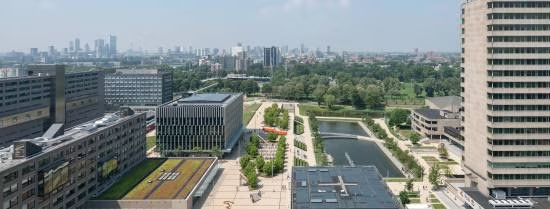Teenagers have the reputation of being very preoccupied with themselves. Research of PhD student Renske van der Cruijsen, Erasmus School of Social and Behavioral Sciences (ESSB), shows that this has an important function in the development of a positive self-image. At the same time, her dissertation 'Exploring Me in a World of We' shows that the self-image of young people is mainly formed in the interaction with others.
Adolescence is all about breaking away from your parents and developing your own identity. It is an important phase for young people to get to know themselves and to get a positive image of themselves. It is therefore not surprising that young people spend a lot of time thinking about themselves. According to researcher Renske van der Cruijsen, this has an important function in the development of adolescents. At the same time, her research shows that self-image is mainly formed in the interaction with others. "When adolescents indicate how well certain character traits fit them, we see, for example, that this strongly corresponds with how adolescents think others judge them on those same traits. It is striking that this overlap becomes stronger later in the teenage years."
Self-image and the brain
The brain areas involved in thinking about yourself and others belong to the 'social brain network'. These areas are known for their involvement in social tasks, such as understanding the thinking and intentions of others. MRI scans show that when you think about yourself, the same brain areas become active as when you think about what others think of you. "My research thus shows that the self and the other are strongly interwoven. That also explains the title of my dissertation: Exploring Me in a World of We."
The research further shows that different domains can be distinguished for self-image, such as the academic, external, and (pro)social domain. Young people do not have to be equally positive about themselves in all domains. Some brain areas are always involved in thinking about oneself, while other brain areas are specifically involved in reflecting on oneself in a particular domain. In addition, the research shows that self-image is temporarily more negative in the middle of adolescence.
This is an important insight, according to the PhD student, because a negative self-image and low self-confidence are related to negative feelings such as anxiety and depression. This dip is strongest for the academic self-image of young people. Academic self-esteem relates, for example, to how smart young people consider themselves to be or how they assess their own study motivation. "This dip falls precisely in a period when many young people have to make choices for a subsequent course of study. Especially now that they have to make a good choice at once because of the loan system, it is very important that young people receive proper guidance in this."
Autism and self-image
Van der Cruijsen also studied the self-image of young people with autism. Although brain activation when thinking about yourself is the same as in their peers, their self-image does show differences. Young people with more characteristics of autism are more vulnerable to developing lower self-confidence, i.e. the feeling of being a valuable person. They also think more negatively about their appearance and their prosocial self-image is lower. Prosocial behaviour is behaviour that benefits others, such as helping others or cooperating. Autism is not related to the academic self-image of young people.
Corona and isolation
If anything becomes clear from the research, it is that interaction with others is very important for developing a (positive) self-image. Therefore, the corona pandemic has a major impact on young people in particular. "Getting to know yourself in a social context was much more difficult during lockdowns because limited contact outside the family was possible. Additional research must show what this means for the development of self-image. Nevertheless, young people in the first lockdown also said they had learned things about themselves. They turned out to be more flexible than they thought, and sometimes they found an evening without social contact to be nice and quiet.”

- PhD student
- Related content

